Simple Stretches That Can Help Your Feet
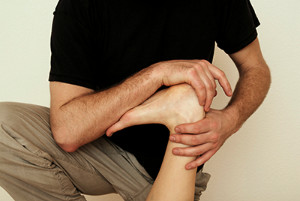 People who regularly stretch their feet are often aware of the benefits that can come from frequently practicing foot stretches. An effective way to stretch the Achilles tendon is done by standing on a step, and gently lowering one foot at a time. The big toe can be stretched by grasping the heel while sitting down, and slowly bending the big toe toward you. Additionally, this is helpful in stretching the sole of the foot. The toes can become stronger when a towel curl stretch is performed. This is practiced by placing your foot on a towel, and gently grabbing it with your toes. For more information about the benefits of stretching the feet, please schedule an appointment with a podiatrist.
People who regularly stretch their feet are often aware of the benefits that can come from frequently practicing foot stretches. An effective way to stretch the Achilles tendon is done by standing on a step, and gently lowering one foot at a time. The big toe can be stretched by grasping the heel while sitting down, and slowly bending the big toe toward you. Additionally, this is helpful in stretching the sole of the foot. The toes can become stronger when a towel curl stretch is performed. This is practiced by placing your foot on a towel, and gently grabbing it with your toes. For more information about the benefits of stretching the feet, please schedule an appointment with a podiatrist.
Stretching the feet is a great way to prevent injuries. If you have any concerns with your feet consult with Donald Manger, DPM from Associated Podiatric Physicians, PA. Our doctor will assess your condition and provide you with quality foot and ankle treatment.
Stretching the Feet
Being the backbone of the body, the feet carry your entire weight and can easily become overexerted, causing cramps and pain. As with any body part, stretching your feet can serve many benefits. From increasing flexibility to even providing some pain relief, be sure to give your feet a stretch from time to time. This is especially important for athletes or anyone performing aerobic exercises, but anyone experiencing foot pain or is on their feet constantly should also engage in this practice.
Great ways to stretch your feet:
- Crossing one leg over the others and carefully pull your toes back. Do 10-20 repetitions and repeat the process for each foot
- Face a wall with your arms out and hands flat against the wall. Step back with one foot and keep it flat on the floor while moving the other leg forward. Lean towards the wall until you feel a stretch. Hold for 30 seconds and perform 10 repetitions for each foot
- Be sure not to overextend or push your limbs too hard or you could risk pulling or straining your muscle
Individuals who tend to their feet by regular stretching every day should be able to minimize foot pain and prevent new problems from arising.
If you have any questions, please feel free to contact our office located in Hamilton Township, NJ . We offer the newest diagnostic and treatment technologies for all your foot care needs.
Teenagers and Sever’s Disease
 Children and young teenagers may be affected by a condition that is referred to as Sever’s disease. This may occur when they frequently participate in certain sporting activities. It is known as a condition that impacts the growth plate in the heel, and can cause severe pain and discomfort. Heel pain is a common symptom, and many children begin to limp to diminish the weight on the foot. Moderate relief may be found when the foot is elevated, and when specific foot stretches are performed. This may help a tight Achilles tendon to loosen, which may aid in decreasing tension on the tendons that are connected to the heel. Additionally, it is important to wear shoes that fit correctly, which generally consists of ensuring there is adequate support and cushioning. If you notice your child is limping, or complaining of heel pain, please schedule an appointment with a podiatrist who can properly diagnose and treat Sever’s disease.
Children and young teenagers may be affected by a condition that is referred to as Sever’s disease. This may occur when they frequently participate in certain sporting activities. It is known as a condition that impacts the growth plate in the heel, and can cause severe pain and discomfort. Heel pain is a common symptom, and many children begin to limp to diminish the weight on the foot. Moderate relief may be found when the foot is elevated, and when specific foot stretches are performed. This may help a tight Achilles tendon to loosen, which may aid in decreasing tension on the tendons that are connected to the heel. Additionally, it is important to wear shoes that fit correctly, which generally consists of ensuring there is adequate support and cushioning. If you notice your child is limping, or complaining of heel pain, please schedule an appointment with a podiatrist who can properly diagnose and treat Sever’s disease.
Sever's disease often occurs in children and teens. If your child is experiencing foot or ankle pain, see Donald Manger, DPM from Associated Podiatric Physicians, PA. Our doctor can treat your child’s foot and ankle needs.
Sever’s Disease
Sever’s disease is also known as calcaneal apophysitis, which is a medical condition that causes heel pain I none or both feet. The disease is known to affect children between the ages of 8 and 14.
Sever’s disease occurs when part of the child’s heel known as the growth plate (calcaneal epiphysis) is attached to the Achilles tendon. This area can suffer injury when the muscles and tendons of the growing foot do not keep pace with bone growth. Therefore, the constant pain which one experiences at the back of the heel will make the child unable to put any weight on the heel. The child is then forced to walk on their toes.
Symptoms
Acute pain – Pain associated with Sever’s disease is usually felt in the heel when the child engages in physical activity such as walking, jumping and or running.
Highly active – Children who are very active are among the most susceptible in experiencing Sever’s disease, because of the stress and tension placed on their feet.
If you have any questions, please feel free to contact our office located in Hamilton Township, NJ . We offer the newest diagnostic and treatment technologies for all your foot and ankle injuries.
Wearing High Heels May Cause Uncomfortable Foot Conditions
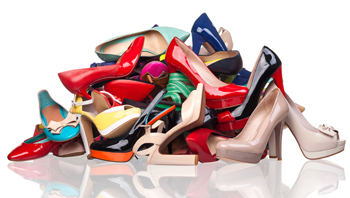 Many women choose to wear high heels for several reasons, despite knowing they may hurt their feet. These types of shoes can be stylish, and can accentuate a particular clothing style, in addition to making the legs appear slender. It is important to purchase the right size shoes, which may help to ensure maximum comfort. The toes may benefit when there is adequate room for them to move freely, and this can be accomplished by choosing shoes that have a round toe area. The feet may need to rest after wearing high heels, and it is recommended to alternate with shoes that have a lower heel. Foot conditions that may develop from frequently wearing high heels can consist of bunions, hammertoe, corns, and blisters. If you would like additional information about how high heels can impact the feet, it is suggested that you confer with a podiatrist.
Many women choose to wear high heels for several reasons, despite knowing they may hurt their feet. These types of shoes can be stylish, and can accentuate a particular clothing style, in addition to making the legs appear slender. It is important to purchase the right size shoes, which may help to ensure maximum comfort. The toes may benefit when there is adequate room for them to move freely, and this can be accomplished by choosing shoes that have a round toe area. The feet may need to rest after wearing high heels, and it is recommended to alternate with shoes that have a lower heel. Foot conditions that may develop from frequently wearing high heels can consist of bunions, hammertoe, corns, and blisters. If you would like additional information about how high heels can impact the feet, it is suggested that you confer with a podiatrist.
High heels have a history of causing foot and ankle problems. If you have any concerns about your feet or ankles, contact Donald Manger, DPM from Associated Podiatric Physicians, PA. Our doctor can provide the care you need to keep you pain-free and on your feet.
Effects of High Heels on the Feet
High heels are popular shoes among women because of their many styles and societal appeal. Despite this, high heels can still cause many health problems if worn too frequently.
Which Parts of My Body Will Be Affected by High Heels?
- Ankle Joints
- Achilles Tendon – May shorten and stiffen with prolonged wear
- Balls of the Feet
- Knees – Heels cause the knees to bend constantly, creating stress on them
- Back – They decrease the spine’s ability to absorb shock, which may lead to back pain. The vertebrae of the lower back may compress.
What Kinds of Foot Problems Can Develop from Wearing High Heels?
- Corns
- Calluses
- Hammertoe
- Bunions
- Morton’s Neuroma
- Plantar Fasciitis
How Can I Still Wear High Heels and Maintain Foot Health?
If you want to wear high heeled shoes, make sure that you are not wearing them every day, as this will help prevent long term physical problems. Try wearing thicker heels as opposed to stilettos to distribute weight more evenly across the feet. Always make sure you are wearing the proper shoes for the right occasion, such as sneakers for exercising. If you walk to work, try carrying your heels with you and changing into them once you arrive at work. Adding inserts to your heels can help cushion your feet and absorb shock. Full foot inserts or metatarsal pads are available.
If you have any questions please feel free to contact our office located in Hamilton Township, NJ . We offer the newest diagnostic and treatment technologies for all your foot and ankle needs.
Podiatrists Can Treat Arthritis in the Feet
 Arthritis is defined as inflammation that occurs in the joints. When this happens in the feet, it can cause difficulty in walking, and this is often a result of severe pain and discomfort. Osteoarthritis can cause the cartilage in the joints to gradually diminish, and walking and standing can be difficult to maintain. Gout is a type of arthritis that can be caused by genetic factors, or from eating foods that can cause elevated uric acid levels in the blood. The pain that often accompanies gout is found in the joints of the big toe, and additional symptoms may include redness and tenderness. Rheumatoid arthritis can cause deformities in various joints in the body, and patients who have this type of arthritis may feel tired for long periods of time. There are effective methods to treat arthritis in the feet, and it is suggested that you consult with a podiatrist who can offer you proper treatment techniques.
Arthritis is defined as inflammation that occurs in the joints. When this happens in the feet, it can cause difficulty in walking, and this is often a result of severe pain and discomfort. Osteoarthritis can cause the cartilage in the joints to gradually diminish, and walking and standing can be difficult to maintain. Gout is a type of arthritis that can be caused by genetic factors, or from eating foods that can cause elevated uric acid levels in the blood. The pain that often accompanies gout is found in the joints of the big toe, and additional symptoms may include redness and tenderness. Rheumatoid arthritis can cause deformities in various joints in the body, and patients who have this type of arthritis may feel tired for long periods of time. There are effective methods to treat arthritis in the feet, and it is suggested that you consult with a podiatrist who can offer you proper treatment techniques.
Arthritis can be a difficult condition to live with. If you are seeking treatment, contact Donald Manger, DPM from Associated Podiatric Physicians, PA. Our doctor can provide the care you need to keep you pain-free and on your feet.
Arthritic Foot Care
Arthritis is a term that is commonly used to describe joint pain. The condition itself can occur to anyone of any age, race, or gender, and there are over 100 types of it. Nevertheless, arthritis is more commonly found in women compared to men, and it is also more prevalent in those who are overweight. The causes of arthritis vary depending on which type of arthritis you have. Osteoarthritis for example, is often caused by injury, while rheumatoid arthritis is caused by a misdirected immune system.
Symptoms
- Swelling
- Pain
- Stiffness
- Decreased Range of Motion
Arthritic symptoms range in severity, and they may come and go. Some symptoms stay the same for several years but could potentially get worse with time. Severe cases of arthritis can prevent its sufferers from performing daily activities and make walking difficult.
Risk Factors
- Occupation – Occupations requiring repetitive knee movements have been linked to osteoarthritis
- Obesity – Excess weight can contribute to osteoarthritis development
- Infection – Microbial agents can infect the joints and trigger arthritis
- Joint Injuries – Damage to joints may lead to osteoarthritis
- Age – Risk increases with age
- Gender –Most types are more common in women
- Genetics – Arthritis can be hereditary
If you suspect your arthritis is affecting your feet, it is crucial that you see a podiatrist immediately. Your doctor will be able to address your specific case and help you decide which treatment method is best for you.
If you have any questions, please feel free to contact our office located in Hamilton Township, NJ . We offer the newest diagnostic and treatment technologies for all your foot care needs.
Possible Causes of Cracked Heels
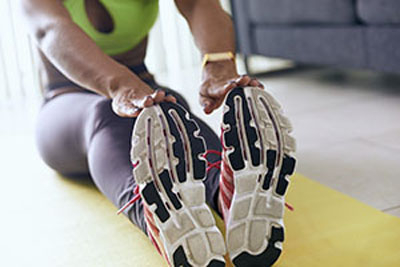 The condition that is known as cracked heels is a common foot condition that may occur as a result of wearing shoes that have an open back. These types of shoes may lack the support that is needed to maintain the natural moisture of the skin, and deep cracks, or fissures may develop. Some patients are more susceptible to developing cracked heels than others. These may include people who have medical conditions consisting of diabetes, eczema, or psoriasis. It can be beneficial to incorporate healthy foods into your diet, which may provide the necessary nutrients that can aid in preventing cracked heels. Patients have found mild relief when the feet are washed and dried thoroughly, followed by frequently applying a good moisturizer. If you notice cracked heels are beginning to develop, please consult with a podiatrist as quickly as possible who can help you to remedy this ailment.
The condition that is known as cracked heels is a common foot condition that may occur as a result of wearing shoes that have an open back. These types of shoes may lack the support that is needed to maintain the natural moisture of the skin, and deep cracks, or fissures may develop. Some patients are more susceptible to developing cracked heels than others. These may include people who have medical conditions consisting of diabetes, eczema, or psoriasis. It can be beneficial to incorporate healthy foods into your diet, which may provide the necessary nutrients that can aid in preventing cracked heels. Patients have found mild relief when the feet are washed and dried thoroughly, followed by frequently applying a good moisturizer. If you notice cracked heels are beginning to develop, please consult with a podiatrist as quickly as possible who can help you to remedy this ailment.
If the skin on your feet starts to crack, you may want to see a podiatrist to find treatment. If you have any concerns, contact Donald Manger, DPM from Associated Podiatric Physicians, PA. Our doctor can provide the care you need to keep you pain-free and on your feet.
Cracked Heels
It is important to moisturize your cracked heels in order to prevent pain, bleeding, and infection. The reason cracked heels form is because the skin on the foot is too dry to support the immense pressure placed on them. When the foot expands, the dry skin on the foot begins to split.
Ways to Help Heal Them
- Invest in a good foot cream
- Try Using Petroleum Jelly
- Ease up on Soaps
- Drink Plenty of Water
Ways to Prevent Cracked Heels
- Moisturize After Showering
- Skip a Shower
- Keep Shower Water Lukewarm
- Don’t Scrub Your Feet
If you are unsure how to proceed in treating cracked heels, seek guidance from a podiatrist. Your doctor will help you with any questions or information you may need.
If you have any questions, please feel free to contact our office located in Hamilton Township, NJ . We offer the newest diagnostic and treatment technologies for all your foot care needs.
Foot Pain and Morton’s Neuroma
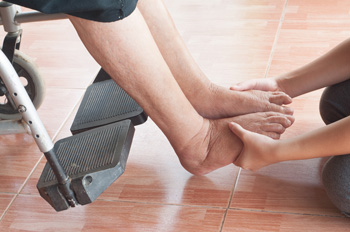 Morton’s neuroma is an uncomfortable foot condition that may develop for a number of reasons. One common cause of Morton’s neuroma is ill-fitting footwear. Those who wear shoes that restrict or constrain the toes may develop Morton’s neuroma. This condition is caused by a pinch nerve that creates a sharp, burning sensation that can be incredibly painful. Some patients that have had this condition describe experiencing feeling as if they are walking with a pebble stuck in their shoe. Most of the discomfort from this condition is felt in the ball of the foot or toe areas. To help find relief, it may be helpful to wear wider shoes. For professional advice on how to treat this condition, it’s suggested that you consult with a podiatrist.
Morton’s neuroma is an uncomfortable foot condition that may develop for a number of reasons. One common cause of Morton’s neuroma is ill-fitting footwear. Those who wear shoes that restrict or constrain the toes may develop Morton’s neuroma. This condition is caused by a pinch nerve that creates a sharp, burning sensation that can be incredibly painful. Some patients that have had this condition describe experiencing feeling as if they are walking with a pebble stuck in their shoe. Most of the discomfort from this condition is felt in the ball of the foot or toe areas. To help find relief, it may be helpful to wear wider shoes. For professional advice on how to treat this condition, it’s suggested that you consult with a podiatrist.
Morton’s neuroma is a very uncomfortable condition to live with. If you think you have Morton’s neuroma, contact Donald Manger, DPM of Associated Podiatric Physicians, PA. Our doctor will attend to all of your foot care needs and answer any of your related questions.
Morton’s Neuroma
Morton's neuroma is a painful foot condition that commonly affects the areas between the second and third or third and fourth toe, although other areas of the foot are also susceptible. Morton’s neuroma is caused by an inflamed nerve in the foot that is being squeezed and aggravated by surrounding bones.
What Increases the Chances of Having Morton’s Neuroma?
- Ill-fitting high heels or shoes that add pressure to the toe or foot
- Jogging, running or any sport that involves constant impact to the foot
- Flat feet, bunions, and any other foot deformities
Morton’s neuroma is a very treatable condition. Orthotics and shoe inserts can often be used to alleviate the pain on the forefront of the feet. In more severe cases, corticosteroids can also be prescribed. In order to figure out the best treatment for your neuroma, it’s recommended to seek the care of a podiatrist who can diagnose your condition and provide different treatment options.
If you have any questions, please feel free to contact our office located in Hamilton Township, NJ . We offer the newest diagnostic and treatment technologies for all your foot care needs.
Possible Causes of Wounds on the Feet
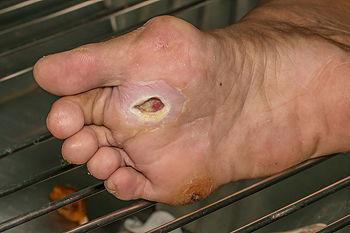 It is beneficial for wounds on the feet to be promptly treated. They may occur from stepping on a piece of glass or a sharp object. Patients who are diabetic may endure wounds on the feet, and this may be a result of a condition known as neuropathy that often accompanies diabetes. This condition affects the ability to feel if there are wounds, bruises, or cuts, which may cause them to easily become infected. Minor wounds may be treated by washing and drying the affected area thoroughly, followed by applying a clean bandage over the wound. Severe wounds on the feet may need medical attention, and it is strongly suggested that you seek the counsel of a podiatrist who can guide you toward proper treatment.
It is beneficial for wounds on the feet to be promptly treated. They may occur from stepping on a piece of glass or a sharp object. Patients who are diabetic may endure wounds on the feet, and this may be a result of a condition known as neuropathy that often accompanies diabetes. This condition affects the ability to feel if there are wounds, bruises, or cuts, which may cause them to easily become infected. Minor wounds may be treated by washing and drying the affected area thoroughly, followed by applying a clean bandage over the wound. Severe wounds on the feet may need medical attention, and it is strongly suggested that you seek the counsel of a podiatrist who can guide you toward proper treatment.
Wound care is an important part in dealing with diabetes. If you have diabetes and a foot wound or would like more information about wound care for diabetics, consult with Donald Manger, DPM from Associated Podiatric Physicians, PA. Our doctor will assess your condition and provide you with quality foot and ankle treatment.
What Is Wound Care?
Wound care is the practice of taking proper care of a wound. This can range from the smallest to the largest of wounds. While everyone can benefit from proper wound care, it is much more important for diabetics. Diabetics often suffer from poor blood circulation which causes wounds to heal much slower than they would in a non-diabetic.
What Is the Importance of Wound Care?
While it may not seem apparent with small ulcers on the foot, for diabetics, any size ulcer can become infected. Diabetics often also suffer from neuropathy, or nerve loss. This means they might not even feel when they have an ulcer on their foot. If the wound becomes severely infected, amputation may be necessary. Therefore, it is of the upmost importance to properly care for any and all foot wounds.
How to Care for Wounds
The best way to care for foot wounds is to prevent them. For diabetics, this means daily inspections of the feet for any signs of abnormalities or ulcers. It is also recommended to see a podiatrist several times a year for a foot inspection. If you do have an ulcer, run the wound under water to clear dirt from the wound; then apply antibiotic ointment to the wound and cover with a bandage. Bandages should be changed daily and keeping pressure off the wound is smart. It is advised to see a podiatrist, who can keep an eye on it.
If you have any questions, please feel free to contact our office located in Hamilton Township, NJ . We offer the newest diagnostic and treatment technologies for all your foot care needs.
Foot Pain Can Be a Common Ailment
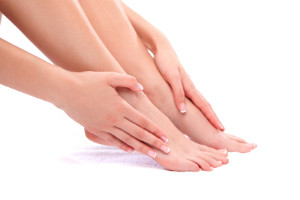 Research has indicated it is likely that many people will experience some type of foot pain during their lives. The foot is a complex structure, and each foot consists of twenty-six bones, in addition to numerous tendons and ligaments. The function of the ankle is to connect the lower leg to the foot. Patients who frequently participate in running and jumping activities may increase their chances of incurring a foot injury that can create a misaligned foot structure and cause foot pain. An Achilles tendon injury may cause considerable pain in the calf and heel area. This can happen if it becomes torn or overstretched, and may be common among athletes. Morton’s neuroma is considered to be a form of nerve pain, and typically affects the ball of your foot. If you are experiencing any type of foot pain, it is strongly suggested that you are under the care of a podiatrist.
Research has indicated it is likely that many people will experience some type of foot pain during their lives. The foot is a complex structure, and each foot consists of twenty-six bones, in addition to numerous tendons and ligaments. The function of the ankle is to connect the lower leg to the foot. Patients who frequently participate in running and jumping activities may increase their chances of incurring a foot injury that can create a misaligned foot structure and cause foot pain. An Achilles tendon injury may cause considerable pain in the calf and heel area. This can happen if it becomes torn or overstretched, and may be common among athletes. Morton’s neuroma is considered to be a form of nerve pain, and typically affects the ball of your foot. If you are experiencing any type of foot pain, it is strongly suggested that you are under the care of a podiatrist.
Foot Pain
Foot pain can be extremely painful and debilitating. If you have a foot pain, consult with Donald Manger, DPM from Associated Podiatric Physicians, PA. Our doctor will assess your condition and provide you with quality foot and ankle treatment.
Causes
Foot pain is a very broad condition that could be caused by one or more ailments. The most common include:
- Bunions
- Hammertoes
- Plantar Fasciitis
- Bone Spurs
- Corns
- Tarsal Tunnel Syndrome
- Ingrown Toenails
- Arthritis (such as Gout, Rheumatoid, and Osteoarthritis)
- Flat Feet
- Injury (from stress fractures, broken toe, foot, ankle, Achilles tendon ruptures, and sprains)
- And more
Diagnosis
To figure out the cause of foot pain, podiatrists utilize several different methods. This can range from simple visual inspections and sensation tests to X-rays and MRI scans. Prior medical history, family medical history, and any recent physical traumatic events will all be taken into consideration for a proper diagnosis.
Treatment
Treatment depends upon the cause of the foot pain. Whether it is resting, staying off the foot, or having surgery; podiatrists have a number of treatment options available for foot pain.
If you have any questions, please feel free to contact our office located in Hamilton Township, NJ . We offer the newest diagnostic and treatment technologies for all your foot care needs.
More...
Runners and Walkers Have Different Needs in Shoes
 There are known differences between walking and running shoes. The type of shoes that runners typically prefer consist of having additional flexibility, which is needed as a result of strong impact on the ground. People who enjoy walking may benefit from footwear with less padding in the heel and arch areas of the feet. Additionally, walking shoes can offer more support than running shoes. They have firmer soles which may help to make walking more comfortable. If you are interested in learning about additional details of the differences between walking and running shoes, please consult with a podiatrist.
There are known differences between walking and running shoes. The type of shoes that runners typically prefer consist of having additional flexibility, which is needed as a result of strong impact on the ground. People who enjoy walking may benefit from footwear with less padding in the heel and arch areas of the feet. Additionally, walking shoes can offer more support than running shoes. They have firmer soles which may help to make walking more comfortable. If you are interested in learning about additional details of the differences between walking and running shoes, please consult with a podiatrist.
For more information about walking shoes versus running shoes, consult with Donald Manger, DPM from Associated Podiatric Physicians, PA. Our doctor can measure your feet to determine what your needs are and help you find an appropriate pair of footwear.
Foot Health: The Differences between Walking & Running Shoes
There are great ways to stay in shape: running and walking are two great exercises to a healthy lifestyle. It is important to know that running shoes and walking shoes are not interchangeable. There is a key difference on how the feet hit the ground when someone is running or walking. This is why one should be aware that a shoe is designed differently for each activity.
You may be asking yourself what the real differences are between walking and running shoes and the answers may shock you.
Differences
Walking doesn’t involve as much stress or impact on the feet as running does. However, this doesn’t mean that you should be any less prepared. When you’re walking, you land on your heels and have your foot roll forward. This rolling motion requires additional support to the feet.
Flexibility – Walking shoes are designed to have soft, flexible soles. This allows the walker to push off easily with each step.
If you have any questions, please feel free to contact our office located in Hamilton Township, NJ . We offer the newest diagnostic and treatment technologies for all your foot care needs.
Stretching Before Running
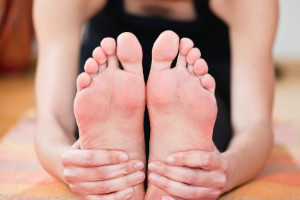 Many people enjoy the sports of running and jogging, and are generally aware of the importance of preventing running injuries. These types of injuries can include ankle sprains, plantar fasciitis, and stress fractures, which typically can cause severe pain and discomfort. Research has indicated the importance of stopping the activity that caused the injury, as this may allow ample time for the affected foot to heal. It is beneficial to drink plenty of water, and accelerate slowly when jogging or running. Additionally, it may help to perform specific stretching techniques before embarking on a run, as this may help to keep the muscles flexible. If you enjoy running, it is suggested that you consult with a podiatrist to learn about how running injuries may affect the feet.
Many people enjoy the sports of running and jogging, and are generally aware of the importance of preventing running injuries. These types of injuries can include ankle sprains, plantar fasciitis, and stress fractures, which typically can cause severe pain and discomfort. Research has indicated the importance of stopping the activity that caused the injury, as this may allow ample time for the affected foot to heal. It is beneficial to drink plenty of water, and accelerate slowly when jogging or running. Additionally, it may help to perform specific stretching techniques before embarking on a run, as this may help to keep the muscles flexible. If you enjoy running, it is suggested that you consult with a podiatrist to learn about how running injuries may affect the feet.
All runners should take extra precaution when trying to avoid injury. If you have any concerns about your feet, contact Donald Manger, DPM of Associated Podiatric Physicians, PA. Our doctor will treat your foot and ankle needs.
How to Prevent Running Injuries
There are a lot of mistakes a runner can make prior to a workout that can induce injury. A lot of athletes tend to overstretch before running, instead of saving those workouts for a post-run routine. Deep lunges and hand-to-toe hamstring pulls should be performed after a workout instead of during a warmup. Another common mistake is jumping into an intense routine before your body is physically prepared for it. You should try to ease your way into long-distance running instead of forcing yourself to rush into it.
More Tips for Preventing Injury
- Incorporate Strength Training into Workouts - This will help improve the body’s overall athleticism
- Improve and Maintain Your Flexibility – Stretching everyday will help improve overall performance
- “Warm Up” Before Running and “Cool Down” Afterward – A warm up of 5-10 minutes helps get rid of lactic acid in the muscles and prevents delayed muscle soreness
- Cross-Training is Crucial
- Wear Proper Running Shoes
- Have a Formal Gait Analysis – Poor biomechanics can easily cause injury
If you have any questions, please feel free to contact our office located in Hamilton Township, NJ . We offer the newest diagnostic and treatment technologies for all your foot care needs.
Gout Is a Form of Arthritis
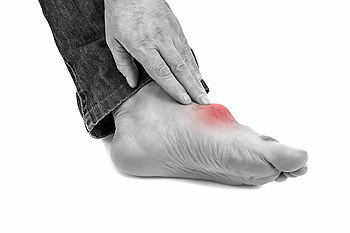 Excess levels of uric acid in the bloodstream may lead to a painful arthritic condition that is known as gout. These particular levels can become elevated as a result of eating foods that have large amounts of purines in them, which can include red meat and seafood. Additionally, foods that have a high sugar content may lead to the development of gout. Common symptoms that are often associated with this condition can include extreme pain on the side of the big toe, swelling, and difficulty walking. There may be existing factors that can lead to the development of gout. These factors can consist of genetic reasons, being overweight, or consuming excess alcohol. Mild relief may be found when anti-inflammatory medicine is taken. If you are routinely affected with gout, it is suggested that you consult with a podiatrist who can properly treat this condition.
Excess levels of uric acid in the bloodstream may lead to a painful arthritic condition that is known as gout. These particular levels can become elevated as a result of eating foods that have large amounts of purines in them, which can include red meat and seafood. Additionally, foods that have a high sugar content may lead to the development of gout. Common symptoms that are often associated with this condition can include extreme pain on the side of the big toe, swelling, and difficulty walking. There may be existing factors that can lead to the development of gout. These factors can consist of genetic reasons, being overweight, or consuming excess alcohol. Mild relief may be found when anti-inflammatory medicine is taken. If you are routinely affected with gout, it is suggested that you consult with a podiatrist who can properly treat this condition.
Gout is a foot condition that requires certain treatment and care. If you are seeking treatment, contact Donald Manger, DPM from Associated Podiatric Physicians, PA. Our doctor will treat your foot and ankle needs.
What Is Gout?
Gout is a type of arthritis caused by a buildup of uric acid in the bloodstream. It often develops in the foot, especially the big toe area, although it can manifest in other parts of the body as well. Gout can make walking and standing very painful and is especially common in diabetics and the obese.
People typically get gout because of a poor diet. Genetic predisposition is also a factor. The children of parents who have had gout frequently have a chance of developing it themselves.
Gout can easily be identified by redness and inflammation of the big toe and the surrounding areas of the foot. Other symptoms include extreme fatigue, joint pain, and running high fevers. Sometimes corticosteroid drugs can be prescribed to treat gout, but the best way to combat this disease is to get more exercise and eat a better diet.
If you have any questions please feel free to contact our office located in Hamilton Township, NJ . We offer the newest diagnostic and treatment technologies for all your foot and ankle needs.



